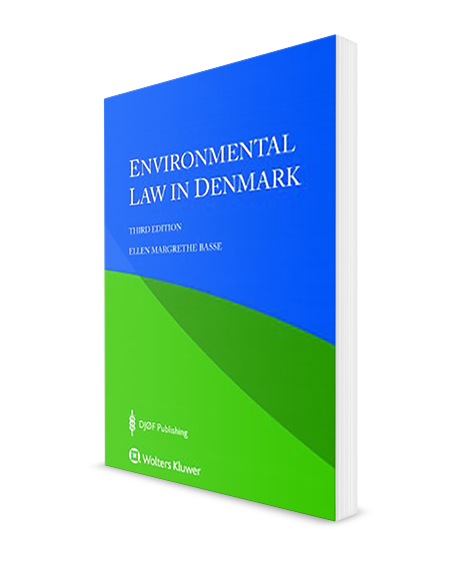
Ellen Margrethe Basse
“Environmental Law in Denmark, Third edition
600 sider, 1.000 DKK
DJØF Publishing, København og Wolters Kluwer, Alphen an den Rijn, 2020
ISBN 978-94-035-1940-1 (Kluwer)
ISBN 978-87-574-4707-1 (DJØF Publishing)
ISBN 978-94-035-1965-4 (eBog)
ISBN 978-94-035-1954-8 (web-PDF)
Oprindeligt en del af det anerkendte flerbinds “International Encyclopaedia of Laws” giver denne bog let adgang til lovgivning og praksis vedrørende miljøet i Danmark. En generel introduktion dækker geografiske forhold, politiske, sociale og kulturelle aspekter, miljølovgivningens kilder og principper, miljølovgivning og offentlige myndigheders rolle.
Hoveddelen af bogen beskæftiger sig først med love, der er rettet direkte mod at beskytte miljøet mod forurening på specifikke områder såsom luft, vand, affald, jord, støj og stråling. Derefter dækker et afsnit om natur- og bevaringsforvaltning beskyttelse af natur- og kulturressourcer såsom monumenter, landskaber, parker og reservater, dyreliv, landbrug, skove, fisk, undergrund og mineraler. Herudover dækkes anvendelse af zone- og arealanvendelsesplanlægning, regler om ansvar og administrative og retslige midler vedrørende miljøspørgsmål. Der er også en analyse af betydningen af international og regional lovgivning og traktater på miljøregulering.
Dens kortfattede, men alligevel videnskabelige karakter, samt den praktiske kvalitet af den information, den giver, gør denne bog anvendelig for miljøadvokater, der behandler sager, der berører Danmark. Akademikere og forskere, såvel som erhvervsinvestorer og de forskellige internationale organisationer på området, vil også med fordel kunne bruge bogen.
The Author
List of Abbreviations
Preface
General Introduction
Chapter 1. General Background
Chapter 2. Basic Principles of Environmental Law
Chapter 3. Historical Background
Chapter 4. Role of Government Institutions in the Shaping and Administration of Environmental Law and Policy
Chapter 5. Sources of Environmental Law and Instruments
Part I. Pollution Control
Chapter 1. General Law
Chapter 2. Air Pollution
Chapter 3. Water Resources and Pollution
Chapter 4. Waste
Chapter 5. Soil Pollution
Chapter 6. Noise Pollution
Chapter 7. Major Accidents, Hazards and Chemicals
Chapter 8. Sustainable Energy
Part II. Nature Conservation and Management
Chapter 1. Biodiversity and Nature Protection Rules and Strategies
Chapter 2. Monuments, Archaeological Nature and Landscape
Chapter 3. Parks, Natura 2000 Sites and Network
Chapter 4. Wildlife Protection and Trading
Chapter 5. Agricultural Resources
Chapter 6. Forests
Chapter 7. Fish Resources
Chapter 8. Subsoil, Minerals and Hydrocarbons, Etc.
Chapter 9. GMOs
Part III. Zoning and Land-Use Planning
Chapter 1. Introduction
Chapter 2. Spatial Planning
Chapter 3. Urban, Rural and Summer Cottage Zoning
Part IV. Liability Questions
Chapter 1. Environmental Versus Civil Liability
Chapter 2. Civil Liability
Chapter 3. Criminal Liability
Part V. Access to Justice
Chapter 1. General
Chapter 2. Administrative Appeals
Chapter 3. Juridical Remedies
Selected Bibliography
Index
Derived from the renowned multi-volume International Encyclopaedia of Laws, this book provides ready access to legislation and practice concerning the environment in Denmark. A general introduction covers geographic considerations, political, social and cultural aspects of environmental study, the sources and principles of environmental law, environmental legislation, and the role of public authorities.
The main body of the book deals first with laws aimed directly at protecting the environment from pollution in specific areas such as air, water, waste, soil, noise, and radiation. Then, a section on nature and conservation management covers protection of natural and cultural resources such as monuments, landscapes, parks and reserves, wildlife, agriculture, forests, fish, subsoil, and minerals. Further treatment includes the application of zoning and land-use planning, rules on liability, and administrative and judicial remedies to environmental issues. There is also an analysis of the impact of international and regional legislation and treaties on environmental regulation.
Its succinct yet scholarly nature, as well as the practical quality of the information it provides, make this book a valuable resource for environmental lawyers handling cases affecting Denmark. Academics and researchers, as well as business investors and the various international organizations in the field, will welcome this very useful guide, and will appreciate its value in the study of comparative environmental law and policy.
Bogen kan købes via forlagets hjemmeside. Klik her.
Bogen kan købes via forlagets hjemmeside. Klik her.